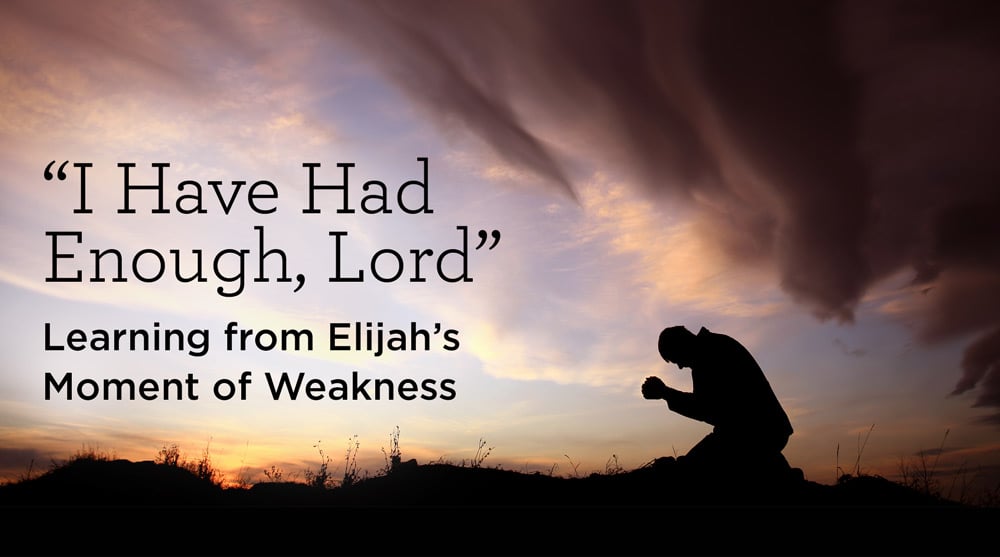
“I have had enough, Lord.” This phrase from 1 Kings 19:4 (NIV) is one many of us feel like saying (or shouting!) frequently on our Christian pilgrimage. Indeed, while we may sometimes think that we are unique in our desire to escape the difficult circumstances that attend the calling to ministry, each of us stands in a long line of God’s people who have faced similar discouragement. The prophet Elijah was one such individual—someone who wanted to escape.
Elijah at His Best and Worst
We often remember Elijah as a heroic figure, as he appears in 1 Kings 18. There, Elijah confronts the prophets of Baal on Mount Carmel and bravely issues a provocative challenge to the people of Israel: “How long will you go limping between two different opinions? If the Lord is God, follow him; but if Baal, then follow him” (1 Kings 18:21).
The narrative then centers on the contest between Elijah and Baal’s false prophets. The prophets shout and dance around their altar in a great show of religious fervor—but there is no response. When the scene turns to Elijah, he takes twelve stones and builds an altar with a trench around it. He arranges the wood, cuts a bull into pieces, and lays it on the wood. He then pours large jars of water all over the wood—so much that the water runs down the altar and fills the trench. Finally, he calls out to God in prayer, and the Lord consumes the sacrifice with fire from heaven.
In 1 Kings 18, we see Elijah at his best, a faithful leader who bravely stands his ground against a multitude of false prophets. But in 1 Kings 19, Elijah displays open cowardice before one woman, Jezebel. Upon hearing that he killed the prophets of Baal, she “sent a messenger to Elijah, saying, ‘So may the gods do to me and more also, if I do not make your life as the life of one of them by this time tomorrow’” (1 Kings 19:2). As a result, Elijah quickly goes from resting in God’s will to running from God—and for his life.
Elijah had stood alone for God. He had manifested a concern for God’s glory, a humility that was unparalleled, and a powerful prayer life. Yet almost in a moment, a threat from one individual paralyzed him with fear.
The Bible has no interest in exalting individuals by covering up their blemishes. We can look at the characters of the Bible and see our own weaknesses reflected in their lives. No matter how richly gifted they may be or how greatly God may use them, the moment He withdraws His sustaining power, we see them for what they are: mere earthen vessels (2 Cor. 4:7).
No man or woman stands any longer than he or she is supported by divine grace. The most experienced saints, if left to themselves, are immediately seen to be as weak as water and as timid as mice.
Learning to Walk by Faith
While we may be comforted to know that the Bible’s characters share our weakness, we must also learn from their mistakes so that we do not repeat them. Elijah went from brave faith to fearful flight because his focus changed. He allowed the questions of his heart to overturn his faith rather than allowing his faith to overturn the questions of his heart. As a result, he began to walk not by faith but by sight (2 Cor. 5:7).
Like Elijah’s, our experiences of despair and disappointment are often accompanied by self-pity. In such moments and seasons, we must begin by determining whether we feel discouraged because our focus has moved from God to our circumstances. Whenever we walk by sight and not by faith, our focus inevitably shifts from God and His provision to ourselves and our insufficiency.
Notice that after Elijah flees into the wilderness, he implores God, saying, “Take away my life” (1 Kings 19:4). He then complains to God, “The people of Israel have forsaken your covenant, thrown down your altars, and killed your prophets with the sword, and I, even I only, am left” (v. 10, emphasis added).
“Elijah allowed the questions of his heart to overturn his faith rather than allowing his faith to overturn the questions of his heart.”
What about you? Are you living under the illusion that you are all alone? The temptation to flee comes not only when we have a misplaced focus but also when we are removed from edifying fellowship.
When you find yourself starting to run away and preparing an escape route from faithful Christian service, that is the time to get with your best Christian friends so they can examine your motives. You may find that your desire for escape—from a job, a church, a relationship, whatever it is—stems solely from your own self-interests rather than from a genuine leading of the Holy Spirit. If so, then deliberately cutting yourself off from the path of duty may result in cutting yourself off from the place of greatest usefulness.
If you find yourself in Elijah’s place, be honest with yourself, and be honest with God. Rest assured that He who looks upon you in mercy has not dealt with you as your sins deserve (Ps. 103:10). It is not difficult to believe that God loves you when you’re on the heights of Mount Carmel, but remember: His unfailing love is with you in every season. The lessons you can learn in the valley are lessons that can never be learned on the mountaintop. God takes His children into valleys to teach them what they could not learn on the higher ground.
Adapted from the sermon “I Have Had Enough, Lord” by Alistair Begg.
Topics: Articles
